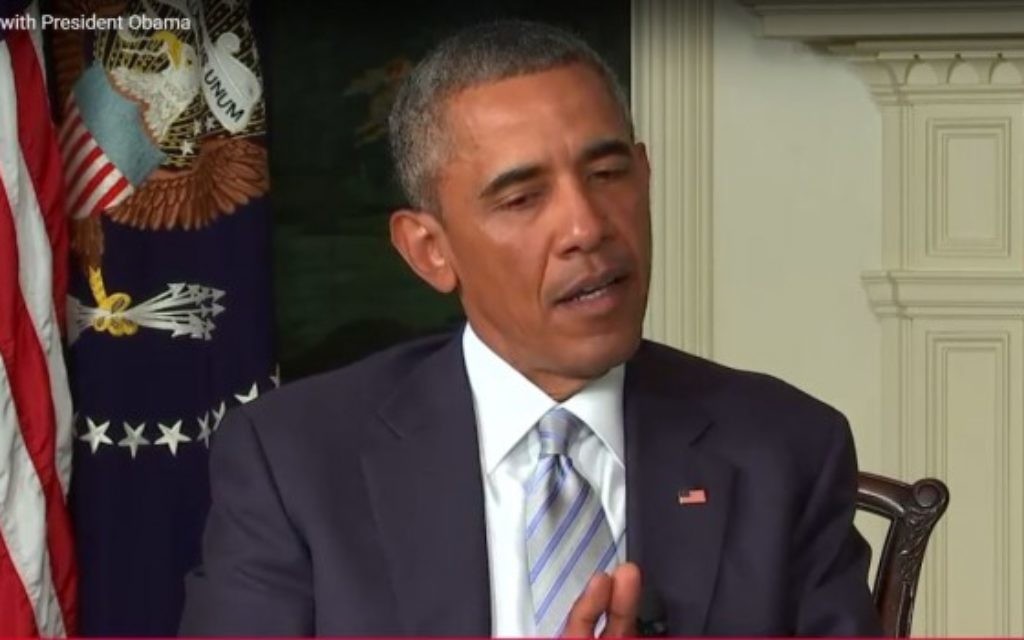Obama: Iran Argument Just a Family Dispute
By Michael Jacobs / mjacobs@atljewishtimes.com

President Barack Obama defended the Iran nuclear deal Friday, Aug. 28, as meeting all of his promises to the American people, and he dismissed the split between his administration and Israeli leaders over the agreement as a family argument.
“The bond between the United States and Israel is not political. It is not based on alliances of convenience,” the president said in a live webcast arranged by the Jewish Federations of North America and the Conference of Presidents of Major American Jewish Organizations. “It is something that grows out of family ties and bonds that stretch back for generations.”
Get The AJT Newsletter by email and never miss our top stories Free Sign Up
Obama said sometimes the angriest disagreements are within families, but he’s confident that Israel and the United States will quickly resume long-term discussions about enhancing Israel’s security by developing a next-generation missile defense system, interdicting weapons shipments to Hamas and Hezbollah, and otherwise countering Iranian proxies in the Middle East.
“The fates of our two countries are intertwined,” he said.

That’s true if the Iran deal goes into effect or if Congress votes to reject the deal and manages to override Obama’s promised veto, the president said.
A rejection of the deal, already endorsed by the U.N. Security Council and the European Union and supported worldwide, would isolate Israel and the United States and result in the collapse of international sanctions instead of their phased rollback, Obama said. “We would be putting Iran in the driver’s seat.”
The House and Senate are expected to vote in mid-September on the deal, under which Iran agrees to roll back its uranium enrichment and freeze its nuclear development for 15 years, allow international inspections of confirmed and suspected nuclear sites, and institute international monitoring of its uranium supply chain.
In exchange, international economic sanctions would be dropped as Iran fulfilled certain steps, such as shipping out of the country most of its enriched uranium, and foreign-held Iranian assets worth anywhere from $56 billion to $150 billion would be unfrozen. An embargo on Iran’s ballistic missile program would end in eight years, and restrictions on uranium enrichment would phase out within 15 years.
Supporters and foes of the deal are “all pro-Israel,” Obama said. “We’re all pro-U.S.-Israel.”
He denied, however, that both sides have been equal in their fervor. He said his side has tried to focus on the facts of the deal, while some of the rhetoric from opponents has appalled him.
Critics of the deal, including Israeli Prime Minister Benjamin Netanyahu, say the agreement legitimizes Iran’s position as a threshold nuclear power and its potential breakout to nuclear weapons in 15 years. They have called for strengthening sanctions to force Iran to accept a better deal.
“The fact is, this is our best way to make sure Iran doesn’t get a nuclear weapon,” Obama said.
He said the world community agreed to sanctions to force Iran to accept just such an agreement, and tougher sanctions now are not possible. He said the only tool left to him if the deal is rejected is a military option, but even that would likely delay Iran by only a year or two if it is determined to build a nuclear arsenal.
He acknowledged that Iran might pursue its nuclear ambitions after 15 years, but at that point the United States and allies would have all the same options to respond as they have now, plus the benefit of 15 years of monitoring and fact-finding related to Iran’s nuclear program, as well as world support for action after trying the diplomatic approach.
“I’ve never understood the logic that says because there may be issues that we have to deal with 15 years from now, we should reject a deal that ensures us for 15 years of not having a nuclear weaponized Iran, and we now are in a situation in which they could break out next year,” Obama said.
He emphasized that the deal does not represent normalized relations with Iran. He called the Iranian government under Ayatollah Khamenei “an unsavory regime” that he doesn’t trust, which is why the deal relies on strict verification.
He also said the anti-Semitic, anti-U.S., anti-Israel attitudes and destabilizing actions of Iran make a deal that removes the nuclear threat crucial. Solving the biggest problem, Obama said, allows the United States to focus on Iran’s other dangers.
“I hope the character of the regime changes, but I’m not counting on it,” he said.
He added that he’s not worried about personal insults from Khamenei. “The United States is the most powerful nation in the world,” Obama said, “and the president of the United States doesn’t respond to taunts.”





comments